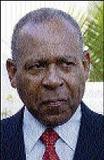Linda Hutchinson-Jafar, Business Writer

Manning
Port-of-Spain, Trinidad:
Trinidadian Prime Minister Patrick Manning presented a US$7 billion budget for the 2007-2008 fiscal year on Monday, using the opportunity to list the country's economic achievements under his watch as the country gears up for general elections.
Opposition critics, however, were not impressed by the figures and believed that more could have been achieved based on the large inflows of revenues over the last five years.
The five-year term of Manning's People's National Movement (PNM) ends in October, but under the constitution, the Government has three additional months in which to call elections.
The budget, based on oil remaining at an average US$50 per barrel and gas price at US$3.55 per mmbtu, is projecting real GDP growth of seven per cent and an average inflation rate of six per cent in 2008.
No irresponsible spending
Based on the Government's assumptions, total revenue is forecast at US$6.4 billion, comprising energy sector revenue of US$2.4 billion and non-energy tax collections of US$3 billion.
"It is certainly not an election budget as some of our critics anticipate ... with profligate and irresponsible spending," the Prime Minister's emphasised in his three and a half hour long presentation in Parliament.
According to the Prime Minister, Trinidad's economy grew an average 9.7 per cent of GDP per year from 2002 to 2006, boasting that it was among the highest growth rates in the world.
Surpassing expectations
This, he argued, was evident in the growth of the economy which doubled from US$9 billion in 2001 to US$18.3 billion in 2006 and an increase in per capita income from US$7,100 in 2002 to US$14,790 in 2006.
While the energy sector was the main driver of this economic expansion, the non-energy sector surpassed expectations, increasing at an average annual rate of six per cent over the period.
The review of the economy estimated that the petroleum sector grew at 4.4 per cent, while the non-petroleum sector is projected to expand by 6.7 per cent.
"The continued strong perfor-mance of the non-petroleum sector is being supported by robust growth in both the services sector (6.6 per cent)and the manufacturing sector (8.0 per cent)," according to the document.
As a result of the boom in economic activity, an average of 14,400 new jobs were created annually, resulting in a reduction in the unemployment rate from 11.7 per cent in 2001 to 5.0 per cent at the end of 2006, the lowest in the country's history.
Job availability
"This has resulted in labour shortages in several sectors and private sector industries now satisfy some of their requirements by importing labour supported by Government's new immigration policy," Manning highlighted. "Anyone who needs a job today can find one, a situation totally different to six short years ago," the 61-year-old Prime Minister said.
The country's official data also point to a major reduction in the poverty rate from 35 per cent in 1990 to 16.7 per cent by 2006.
According to the Prime Minister, the country has been the recipient of significant amounts of foreign direct investment, amounting to close to US$6 billion over the past five years.
Public debt has also been lowered from over 60 per cent of GDP to 28 per cent of GDP currently, while external debt which was 17 per cent of GDP in 2001 is now at 5.0 per cent of GDP.
With oil and gas prices remaining buoyant for most of the period, the country has been able to maintain stability in the exchange rate and increase foreign exchange reserves to approximately US$6.5 billion.
This excludes the Heritage and Stabilisation Fund, which has savings of US$2 billion, representing un-budgeted revenues gained from high international oil prices.
In the last six years, Government collected revenues amounting to US$26 billion, of which US$11.1 billion was derived from the energy sector and US$15 billion from the rest of the economy.
"The high level of energy tax collections reflected buoyant oil and gas prices and the Government's successful efforts at oil and gas tax reform, which increased tax take from any windfall revenues received by the companies," Manning said.
New fiscalregime
Among the main items of the US$20 billion recurrent expenditure over the last six years were wages and salaries to civil servants, goods and services that are made free to the population, subsidies on petroleum products among others.
In terms of spurring further economic growth, Manning said in 2008, his government plans to introduce a new fiscal regime of incentives to stimulate drilling in deep water, marginal fields, heavy oil and farm in and farm out arrangements.
"By these new arrangements, we confidently expect as has happened in the past, new discoveries of oil and gas," he said adding that four rigs are currently engaged in exploratory drilling and 16 wells are carded to be drilled in the last quarter of 2007 and in 2008.
linda.hutchinson-jafar@gleanerjm.com

